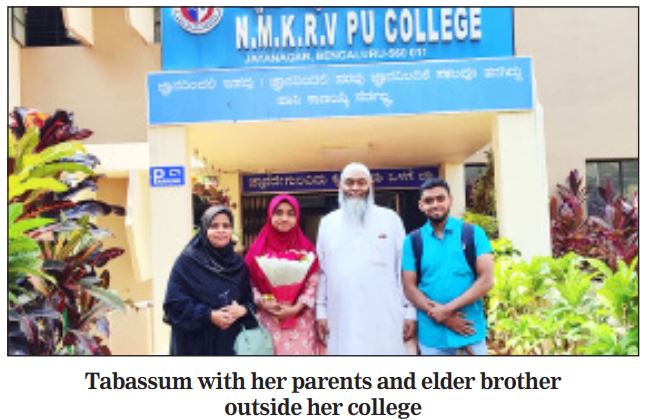When the hijab was banned from classrooms up to Class XII in Karnataka, Tabassum Shaik had been left confused and like many of her peers, stopped going to her classes.
"But my parents saw the bigger picture of how this (dropping out of education) would affect our community and push us deeper into backwardness. So, they encouraged me to continue my studies,” the 17-year-old told The Telegraph on Monday.
More than a year after deciding to listen to her parents, Tabassum is the toast of her family and friends, having topped the pre-university (Class XII) exams from the arts stream with a score of 593 out of a possible 600.

Tabassum, who studied six to eight hours a day while giving equal importance to her religious duties, had initially been traumatised when the hijab was banned in the winter of 2021-22. “I didn’t attend college for two weeks because I couldn’t make up my mind,” she said.
Six of her classmates at the NMKRV Pre-University College in Bangalore, unable to countenance the thought of turning up in class without the headscarf, had dropped out and enrolled for distance education.
“Honestly, I was very confused and depressed because the hijab is an integral part of me and my religion. I had been wearing the hijab since I was five years old,” Tabassum said.
“My parents sat me down and made me understand that this was a kind of trap that would deny education to Muslim girls. They explained to me that if I got into a position of power I could help others from such injustices in the future, and urged me to continue with my studies.”
She added: “However, it took a heavy toll on me; it was very uncomfortable attending classes without my hijab. I also felt very guilty and it played heavily on my conscience. It wasn’t an easy choice to make but I tried to motivate myself.”
Tabassum, now set to do an undergraduate course in psychology from R.V. University in the city, is relieved that she can again wear the hijab in the classroom -– the ban applies only up to Class XII, that is, the stage till which schools and colleges prescribe uniforms.
But, given the current political atmosphere, a fear lingers. “I’m very scared whether I would be allowed to wear the hijab in the university in future,” she said.
Tabassum feels that the hijab ban is unfair in a secular country. “I felt it was very unfair and very illogical that in a secular country I had to give up my hijab to pursue my education when I should ideally be able to do both,” she said.
Tabassum is the second child of electronics engineer Abdul Khaum Shaik and Parveen Shaik. Her elder brother Abdul Kalam Shaik is doing an MTech in machine designing at a Bangalore engineering college.
Tabassum plans to do her master’s in clinical psychology at a foreign university.
The hijab controversy had begun with the Government Pre-University College in Udupi banning the headscarf in classrooms late in December 2021. While most Muslim girls complied, six students sat out the rest of their academic year, which ended in April 2022.
The matter snowballed, with some Muslim groups protesting the ban while pro-Hindutva vigilantes heckled hijab-clad students at schools and colleges. It led the state BJP government to issue a circular empowering educational institutions to prescribe uniforms. This meant a de facto ban on the hijab since no institution dared defy the growing clamour to proscribe the headscarf.
A full bench at Karnataka High Court then upheld the institutions' right to ban the hijab, ruling that the headscarf was not essential religious practice in Islam. The matter is now before the Supreme Court.












